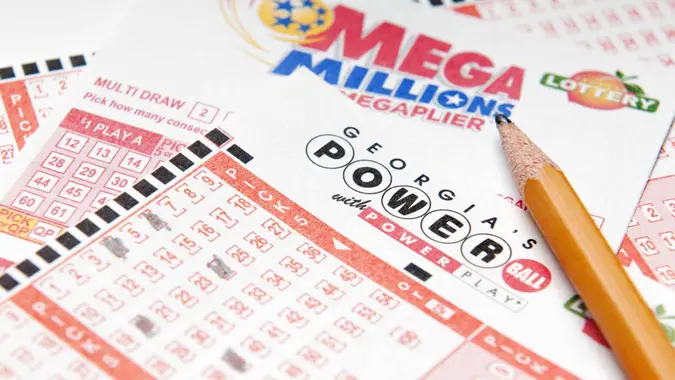Lottery Deception: How Billion-Dollar Jackpots Are Not What You Expect

Commitment to Our Readers
GOBankingRates' editorial team is committed to bringing you unbiased reviews and information. We use data-driven methodologies to evaluate financial products and services - our reviews and ratings are not influenced by advertisers. You can read more about our editorial guidelines and our products and services review methodology.

20 Years
Helping You Live Richer

Reviewed
by Experts

Trusted by
Millions of Readers
The allure of lottery jackpots worth billions is undeniable. The thought of winning such a staggering amount of money can be both exciting and life-changing. However, the reality of these billion-dollar jackpots is often far from what many people expect. Here’s a closer look at the deception behind these massive lottery prizes and what you should know before buying a ticket.
Advertised vs. Actual Payouts
The first deception lies in the advertised jackpot amounts. These figures are usually the annuity option, which pays out over 29 years. Most winners, however, opt for the lump sum payment, which is significantly less than the advertised jackpot. For example, a $1 billion jackpot typically gets taken a 24% – 37% tax withholding which is about $363.4 million. Though this is a huge amount, it’s not nearly what was advertised.
Edwin Castro, with a $2.04 billion Powerball jackpot in November 2022, the largest in history, received received an astonishing $997.6 million, just short of a billion — again, a ridiculously large number but with an advertised $2 billion couldn’t even touch the billion mark.
Odds of Winning
The odds of winning a billion-dollar jackpot are astronomically low. For games like Powerball and Mega Millions, the odds are 1 in 292.2 million and 1 in 302.6 million, respectively. These odds are so slim that spending money on tickets is often compared to throwing money away.
Psychological Effects
Winning a massive lottery jackpot can have unexpected psychological effects. Sudden wealth can lead to stress, anxiety, and even depression. It can also strain relationships with friends and family, as winners often face pressure to share their newfound wealth.
Economic Impact
While lottery jackpots can be life-changing for individuals, they can also have a negative economic impact. Studies have shown that people who can least afford it often spend the most on lottery tickets. This can exacerbate financial struggles and contribute to wealth inequality. Americans spent over $100 billion on lottery tickets alone, according to The Motley Fool. That’s about $300 a person in The United States funding the lottery’s economy.
Conclusion
Billion-dollar lottery jackpots are not what they seem. The actual payouts are much lower than advertised, and the odds of winning are incredibly low. Furthermore, winning such a large sum can have significant tax implications and unexpected psychological effects. While the dream of winning big is enticing, it’s essential to approach lottery tickets with a healthy dose of skepticism and to understand the realities behind the dazzling jackpots.
Editor's note: This article was produced via automated technology and then fine-tuned and verified for accuracy by a member of GOBankingRates' editorial team.
 Written by
Written by  Edited by
Edited by 

























